What It Means to Start Logging
The first log is never perfect. That’s why it matters.
Most people hesitate before they write their first log. We overthink it. We want it to sound smart, meaningful, memorable. But that’s not the point. The value of the first log isn’t in how it sounds—it’s in what it starts. It marks the moment when you move from intention to action, from thinking about logging to actually logging. It’s not perfection; it’s permission.
A blank space is always louder than a quiet sentence.
Empty journals can feel intimidating. A new app with no entries feels like a challenge. But it’s not emptiness you’re facing—it’s potential. One simple sentence, however small, softens that blankness. It tells you: “You’ve started.” That’s how the silence breaks. That’s how something begins.
Logging isn’t a performance. It’s a presence.
The first log doesn’t need to be clever. It doesn’t have to be shareable. It doesn’t need a lesson. Logging isn’t about crafting a message for others. It’s about recognizing a moment for yourself. That first sentence is an act of presence—a decision to observe instead of scroll past, to notice instead of forget.
One sentence doesn’t capture everything. It anchors something.
You might worry that one sentence isn’t enough to describe your day, your thought, your shift in mood. That’s okay. The sentence isn’t meant to explain everything. It’s meant to leave a mark—something you can return to. A reference point. A signal to your future self that something mattered here.
What you write today may not feel important—until later.
At first, your log might seem random or boring. “Had coffee. Feeling tired.” But three months from now, that log might show you the beginning of a pattern: how you handle stress, when you start feeling drained, what energizes you. The first log is the start of a language you build with yourself—one that makes sense only in hindsight.
You don’t need a plan to start. Just attention.
There’s no strategy required. No structure. No long-term commitment. Logging is not a resolution. It’s a pause. A practice in noticing. All you need is a willingness to see something—anything—and write it down. The rest follows.
The first log opens a door that doesn’t close.
Once you write it, something shifts. Logging stops being an idea and becomes a behavior. A relationship forms between you and your timeline. From that point on, life starts to feel slightly more observed, slightly more grounded. Not watched from a distance, but witnessed from within.
There is no wrong way to begin—only not beginning.
You can start with a date, a word, a mood, a quote. You can write about nothing. You can write badly. What matters is that you write. The act itself creates momentum. And once momentum begins, clarity follows.
Starting is an act of self-trust.
You don’t start logging because you already know who you are. You start because part of you believes you’ll figure it out as you go. That belief—that even the smallest record is worth keeping—is how self-awareness takes root. One sentence is enough to tell yourself: “I’m paying attention now.”
The first log is the beginning of your story—not the summary.
It doesn’t need to explain everything. It just needs to begin something. You’re not summarizing your life. You’re stepping into it, one line at a time. This is how all stories start: not with answers, but with the willingness to look.
Every log begins with a single sentence.
Try logging yours with Log0ne — now available on the App Store.


